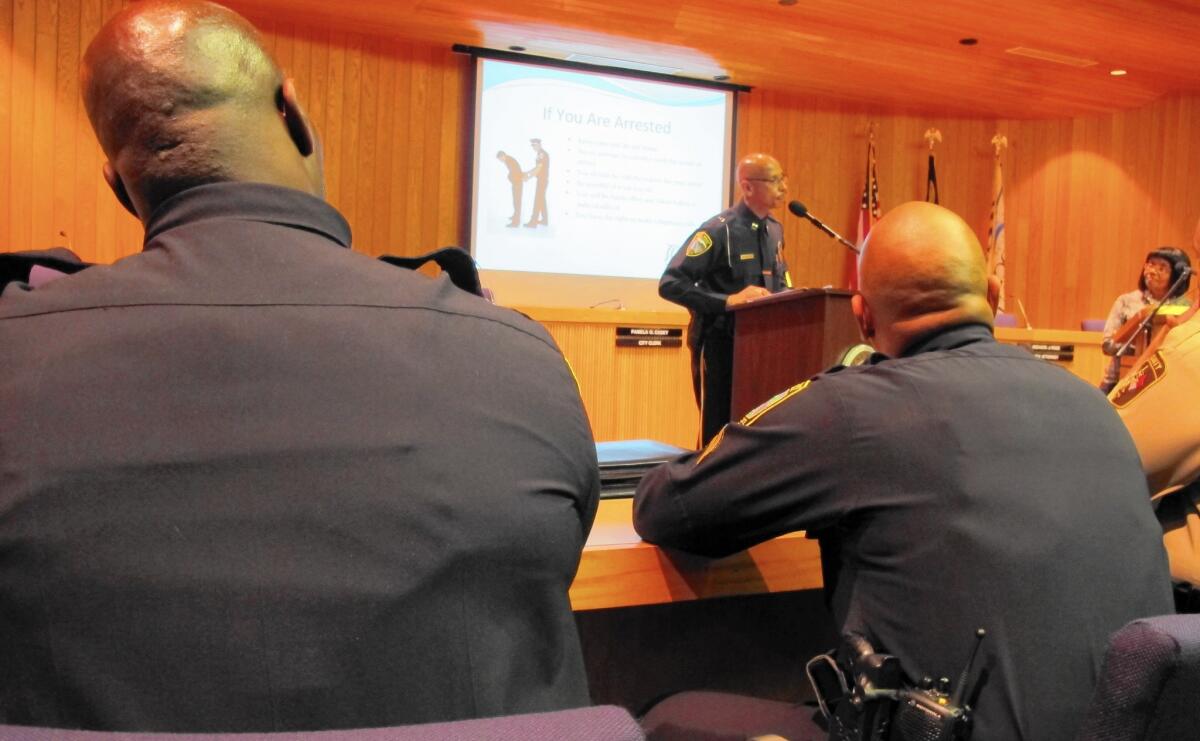In North Carolina, police officers and young black men talk it out

- Share via
Reporting from ROCKY MOUNT, N.C. — Show your hands. Don’t reach for anything. Don’t make sudden movements.
One chilly evening not long ago, a panel of police officers met with citizens gathered here at City Hall to offer advice on a subject that has come up in almost every city in America: What happens when a young African American man is stopped by the police? What makes a traffic stop turn fatal?
This former tobacco town on North Carolina’s flat coastal plain has a population that is 61% black, but it has not experienced a lethal confrontation between a police officer and a young black male. Residents say they want to keep it that way.
“We’re trying to be proactive,” said Archie Jones, the African American director of Rocky Mount’s Human Relations Department, who worked with police to set up the “Know Your Rights” event.
“We know what happened nationally could happen right here,” he said.
The shooting death of unarmed 18-year-old Michael Brown by a white police officer in Ferguson, Mo., in August prompted cities and towns across America to reevaluate the way police deal with African Americans — especially young men. The decision not to prosecute the officer — and not to prosecute a New York City police officer who choked to death an unarmed black man in July — has intensified civic self-examinations.
Though this city of 57,000 people has avoided a deadly, high-profile police encounter, a few young black men have been profiled or harassed by police, said the Rev. Andre Knight, chapter president of the National Assn. for the Advancement of Colored People in Rocky Mount.
“Just because you have a badge and a gun, you don’t have the right to abuse your authority,” Knight said. “You need to know your rights, but the officer does too.”
Jones said he became concerned about potential conflicts after attending a national conference on Ferguson in October. He said he approached Rocky Mount Police Chief James Moore, who told him he had been discussing the same concerns.
“We decided it was time to bring the police and the community together to head off any conflicts,” Jones said. Some people may fear the police, he said, “but in some cases, the police are as fearful as the citizens.”
Because of concerns about potential conflicts between police and young black men, Knight said, his chapter has long sponsored similar “Know Your Rights” sessions for black residents. “The chief apparently think it’s a good idea,” he said.
At the City Hall meeting, Khristian Roberson, 18, listened intently as several police officers — most of them black — answered questions.
Roberson, who is black, said he thought about the Ferguson incident when he was stopped by a police officer one night last month for allegedly running a red light.
“I stayed calm. I wasn’t rude — I didn’t want to antagonize him,” Roberson said. He said his parents had often given him “the talk” — the careful instructions on dealing with police, delivered by worried African American parents nationwide.
Roberson said he granted the officer, who is also black, permission to search his car. He was then let go without being given a traffic citation, he said.
“I thought I was treated OK,” he said. “But my mom thought I might have been profiled.”
After listening to the police presentation, Roberson said it helped refresh his memory of how to behave when stopped by police. “It was a good reminder,” he said.
Ormani Muckle, 17, who attended the meeting with Roberson, added, “It was good to hear the police position straight from them.”
Some of the written questions submitted by audience members were pointed: How can you tell if you’re being profiled? What’s a “threatening motion?” Can you videotape an encounter with police? Should you tell the police if you have a weapon? What have police learned from the deaths in Ferguson and New York?
The officers answered elliptically, choosing their words carefully: Yes, you can videotape the police. No, police aren’t permitted to profile citizens. A “threatening motion” is any sudden movement, especially in the dark. Yes, you should tell police you have a weapon.
As for the Ferguson and New York question, police Lt. Henry King responded, “To have programs like this and partner with the community.”
Someone asked whether police were permitted to draw a weapon on an unarmed suspect. King said officers may use deadly force if physically threatened by a suspect who is bigger and stronger, or who tries to disarm the officer.
“Remember, police officers do not have to absorb a severe beating in the line of duty,” King said.
Audience members, most of them black, nodded, and no one seemed to disagree.
Afterward, Chief Moore, who is black, said those who attended seemed genuinely interested in “the dynamics of police work — especially with all the misinformation they see on TV.”
To close the event, the chief looked out at the crowd and slowly recited: “The police are the public, and the public are the police.”
Twitter: @DavidZucchino
More to Read
Sign up for Essential California
The most important California stories and recommendations in your inbox every morning.
You may occasionally receive promotional content from the Los Angeles Times.











